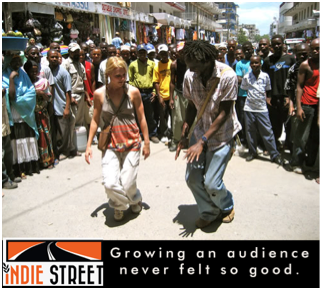By Jay Webb

Previously: What Are Films Without An Audience?
 A large portion of our population has thankfully grown past the phase of only wearing bracelets to feel like we are agents of change in our world or society. Today the world is small enough and access is great enough for every individual to truly make small changes that can accumulate to create huge impact on life and planet. Filmmakers are some of the most dynamic multi-taskers of our world society, and on top of that they already have a solid medium with audiences they can inspire to make important world changes.
A large portion of our population has thankfully grown past the phase of only wearing bracelets to feel like we are agents of change in our world or society. Today the world is small enough and access is great enough for every individual to truly make small changes that can accumulate to create huge impact on life and planet. Filmmakers are some of the most dynamic multi-taskers of our world society, and on top of that they already have a solid medium with audiences they can inspire to make important world changes.
With most all film projects, a director must envision some type of change he/she wants to inspire in the film’s eventual audience. Whether it is changing their perspective, making them laugh, or giving them insight into the world around them, your story should have a designed emotional shift for those you share it with. Having a grasp on this desired viewer transformation not only helps a filmmaker determine their core audience, but might also lead toward partners that will help to champion the film and build a larger base of fans for the future; not to mention it might do some good to your world.
In the previous post, I interviewed director Sean Dunne and we discussed how crowdfunding campaigns can double as a tap into new audiences. Sean is a very progressive filmmaker who has made films built for the Internet, and has a very steadfast notion on where the future of his films’ distribution will lie. This week I spoke to another IndieStreet partner filmmaker, Sylvia Caminer: an Emmy award winning producer/director whose experience is very distinct from Sean’s. Sylvia has much more experience (20+ years) in film, but when it comes to emerging digital distribution models, she admittedly has as much to learn as the rest of us. However, Sylvia’s experience definitely gives her a great edge with strategic planning and overall instincts. With her most recent documentary, “Tanzania: A Journey Within” Sylvia found a non-profit partner and a theatrical distributor who supported her vision…the result was an innovative, socially responsible, marketing campaign that has already afforded her film considerable success. “But a Movie Ticket, Save a Life.”
Learning from seasoned filmmakers like Sylvia is a practice that any level director or producer can benefit from, so listen up.
J.Webb: Sylvia, When did you first have the notion of somehow tying a social cause into your film? Can you talk a bit about the journey that ended with this simple, but powerful campaign?
Sylvia: Before we even began filming in Tanzania we had the idea of trying to find the right cause to get involved with. Once we were in Tanzania filming so many different ideas presented themselves … clean water, education, poverty and of course malaria. One of the film’s subjects, Kristen, had started her charity “Malaika For Life” which sells beautiful handmade African bracelets whose profits provide malaria medicine for Tanzanians who cannot afford it. She’d had quite a bit of success with her “buy a bracelet save a life campaign” and so when I heard about what Malaria No more was doing and how affordable the medicine was I naturally came up with the “Buy a movie ticket, save a life” campaign whereas we use a portion of the proceeds from every ticket sold to provide a life-saving malaria treatment for a child in Africa. This campaign is in effect for the theatrical release of the film and our distributor, Heretic Films, is totally onboard! With further distribution we hope to target another need in Tanzania to partner with. I truly love documentary films and how so many of them get you riled up and wanting to get involved. Our campaign gives the audience an opportunity to act on their emotional ties to the subject, giving them the ability to use their purchasing power to support a cause and literally save a life.
J.Webb: There are lots of new ways for young filmmakers to start building an audience, it can get overwhelming. As a director/producer who has had many films secure traditional distribution deals what is your take on the changing landscape of film and emerging distribution models?
Sylvia: I can’t believe how different distribution has become. There are so many options it is a bit mind numbing. I find every project quite unique and there is no longer a set path for a truly independent film. You can literally create your own path. The uniqueness of every film’s path is actually what made the IndieStreet group attractive…the ability for the group to be supportive and flexible in many different ways depending on what was best for each specific film. The good news about all of the new DIY digital distribution is that it is much easier to get your film out there and available. This does make it much harder to get your film noticed because of all the noise and clutter in the film market. A producer definitely has a lot more work to do in distribution these days and you really should budget time for that. I have been working pretty much non-stop on distributing Tanzania since January as well as getting the narrative feature I produced “Grace.” into the market place.
J.Webb: Please talk about how the campaign with malaria no more help to build your audience for this film, and maybe even for future films.
Sylvia: Malaria No More definitely has a lot of followers so having them tweet about the film and be formally behind the campaign adds a legitimacy to it. We reached malaria awareness supporters that would have otherwise not known about the film. However it isn’t really an easy homerun – we are just a small part of what MNM is working on and they were pretty much consumed with their World Malaria Day campaign in Africa on 4/25 the day we opened in NYC. I think if this had not all happened at the same time the partnership could have been even more productive, so again it’s a lesson in timing. I do hope to work with them or other NPO’s in the future, as I really support the idea of using box office to get behind causes that matter to us.
J.Webb: How did you find it working with a non-profit during your release? How would a filmmaker go about starting the process of getting an NPO on board to help push their film and cause?
Sylvia: I think it is really important to find a cause that makes sense and doesn’t feel forced. Although our film is not a “malaria documentary” I believe the tie-in is quite strong because of Kristen Kenney’s bout with malaria in the film and her ongoing commitment to the cause. Through Malaika she has already provided malaria medicine for more than 22,000 people. That just goes to show the power of social media and how moving images can support a cause. It is really important to be on the same page as the NPO and have a clear understanding of how you plan to move ahead together. I also recommend setting up a calendar before all of the craziness begins-lead time is really important.
While it is probably a little easier to find a relatable cause to a documentary in Africa than a narrative drama or comedy, we feel it is certainly a worthwhile exercise to explore these types of partnerships early on. Forcing an NPO partnership does not make sense, but it is just one of the many innovative techniques you can work into your crowd building strategy. If you have a dark drama about a specific type of drug abuse, check to see if there are any organizations that might raise awareness. If you have a comedy based on a farm, maybe there is a farmer’s group that will love it and want to promote it.
With a small amount of research and discovery work, you may just be able to create a partnership that will help your film’s numbers, and also make you feel even more wonderful than you already do when your film reaches its audience. Even if Sylvia’s Tanzania film had not received the positive reviews it had, the number of lives her efforts have helped to save from a needless disease would be buzz worthy and something to be seriously proud of. The story of a positive social campaign may prove to be as far reaching as the film’s story itself.
Jay Webb – Jay Webb is an independent film producer/writer and small business entrepreneur who has discovered through trial by fire that it is literally impossible for him to choose personal capitalism over passion. Always balancing a life on both sides of the tracks, he has discovered that helping good people succeed (success=happiness) is the core of what drives him. The IndieStreet direct & “group distribution” film initiative is his personal Autobahn.
Web: IndieStreet.com
Twitter: @indiest_films
“Tanzania: A Journey Within” Website: www.tanzaniathemovie.com
You can set up a screening of “Tanzania: A Journey Within” in your community through the wonderful new theatrical platform provided by TUGG!
www.tugg.com/titles/tanzania-movie





